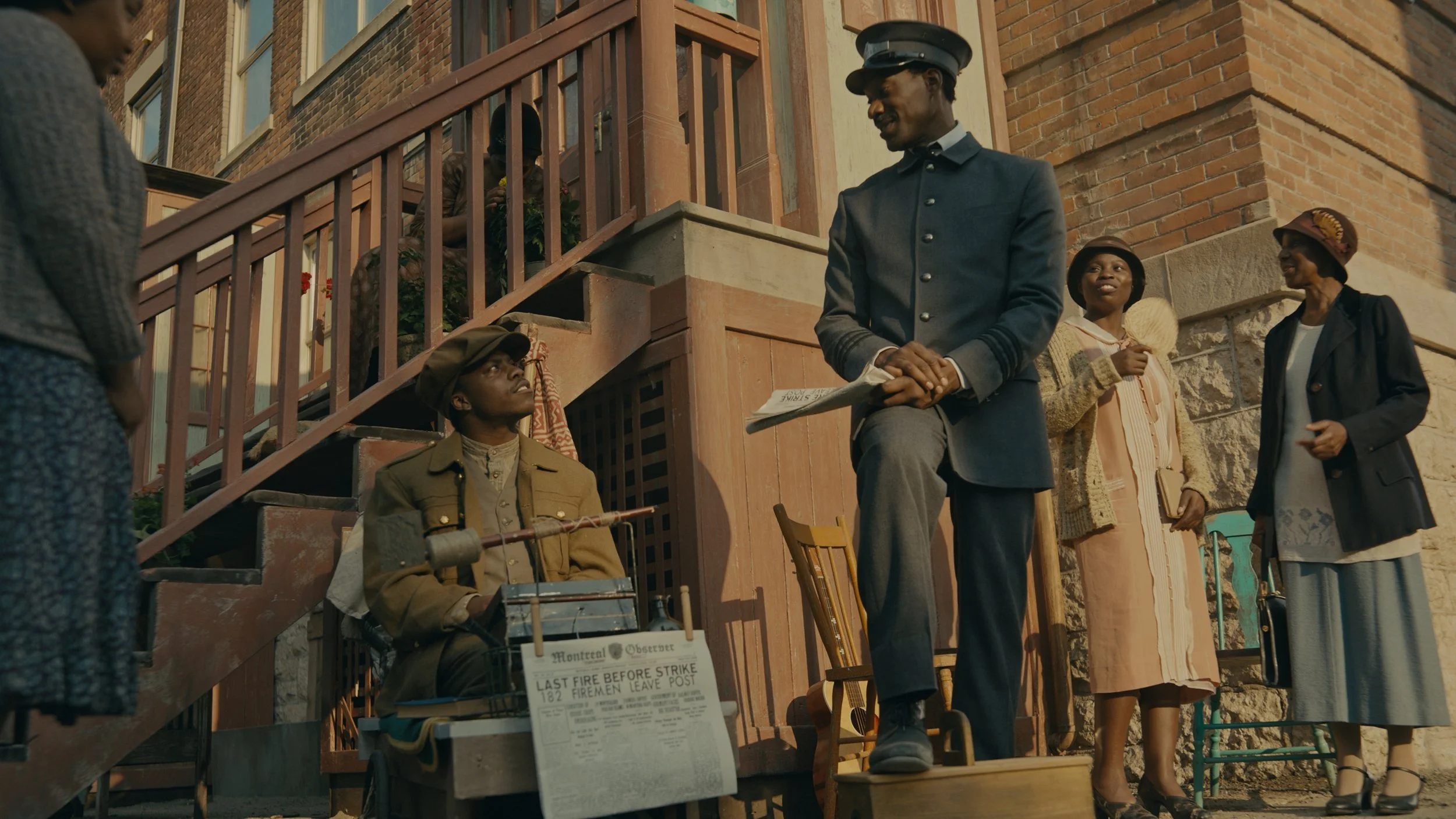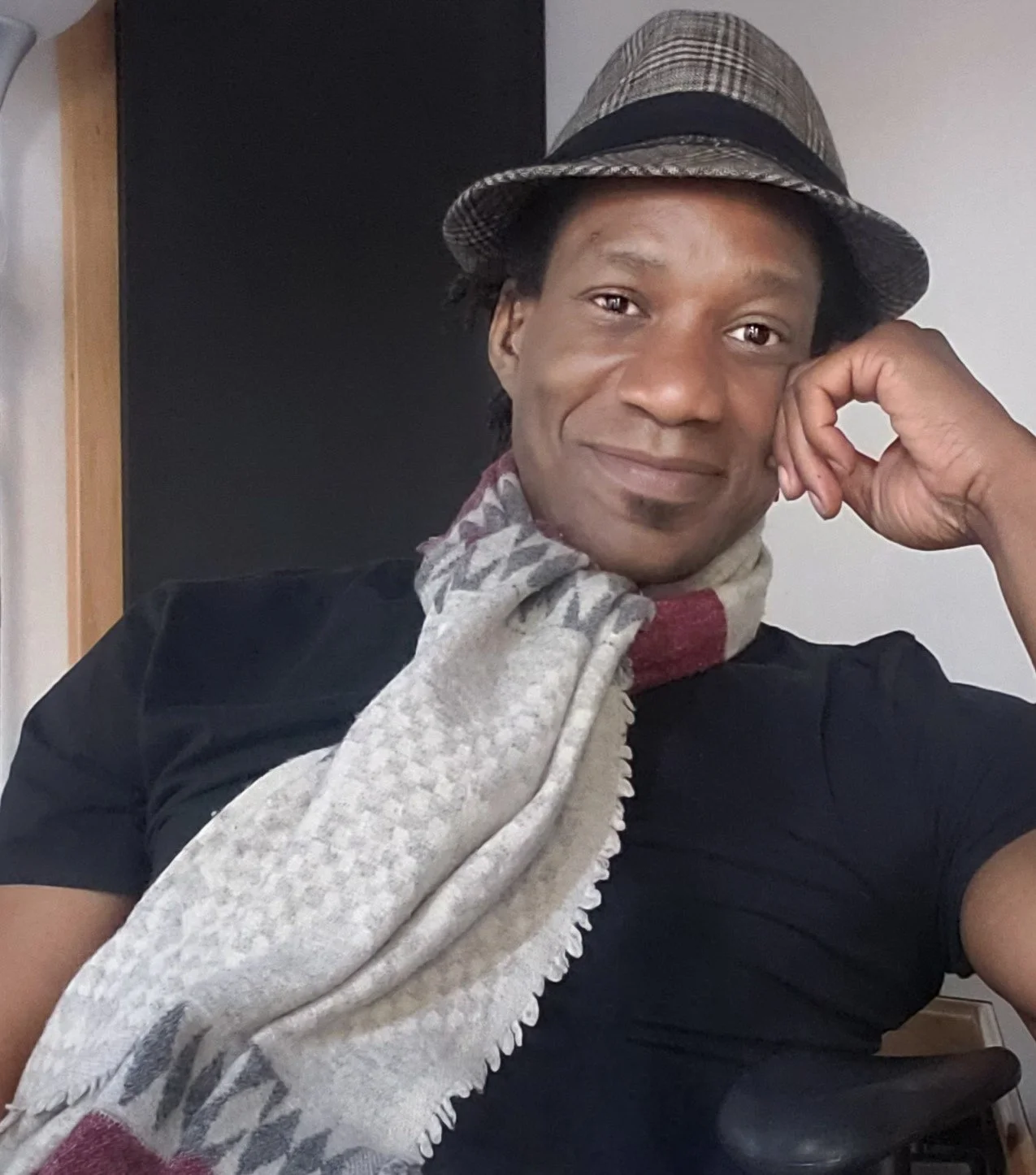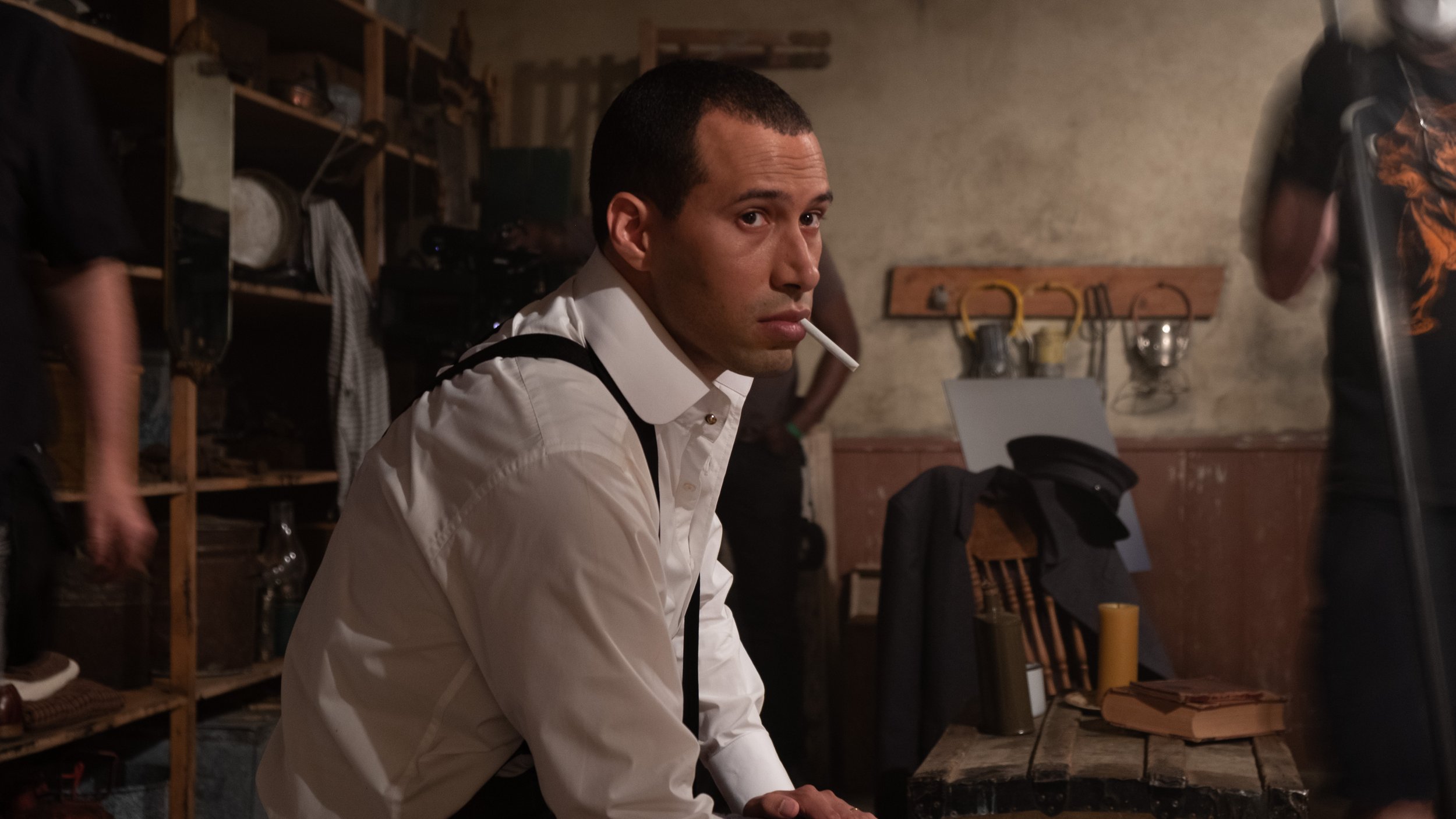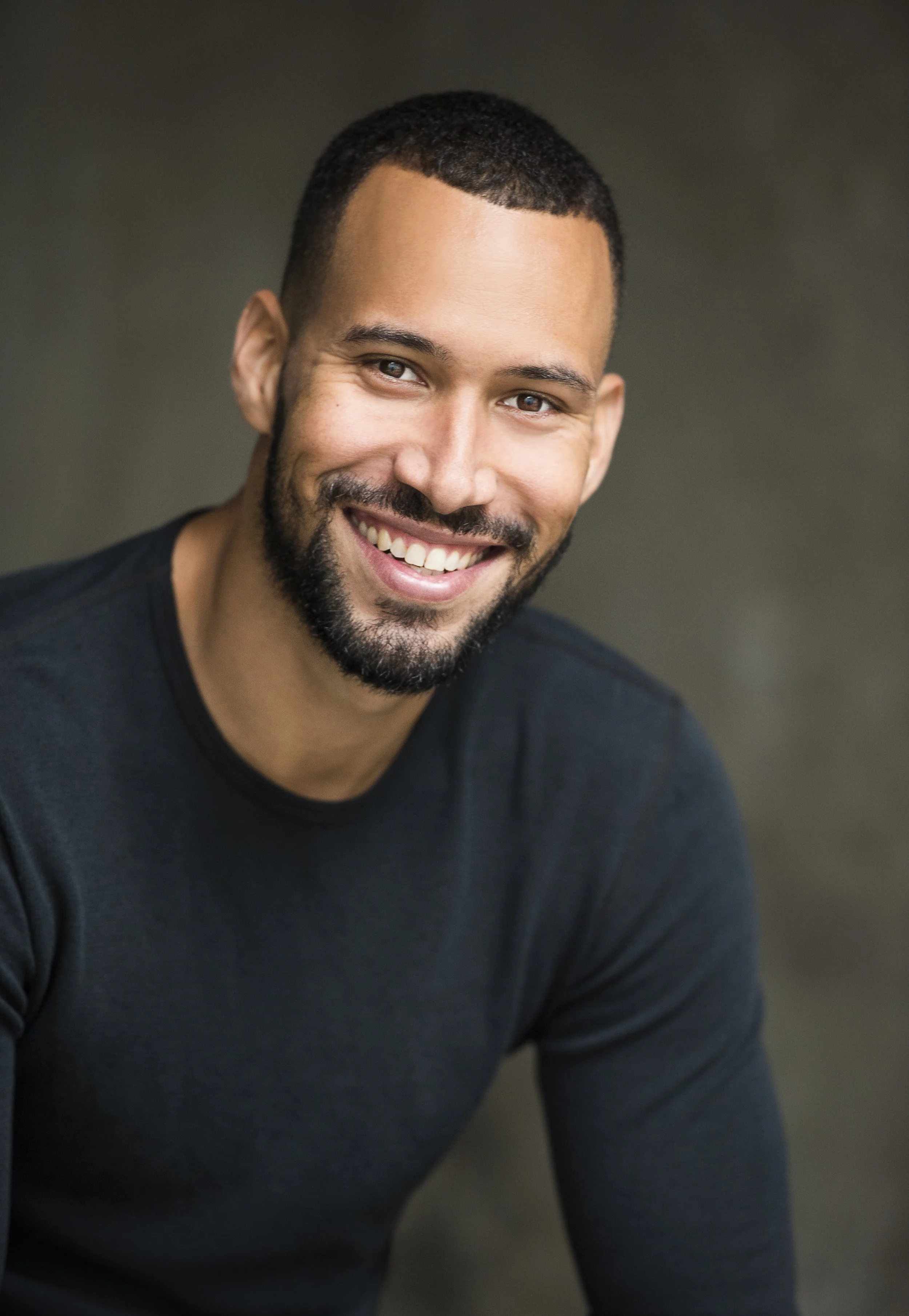The Porter rolls across Canada, sharing stories of the Black diaspora
The new CBC and BET+ original series looks at the lives of railway sleeping-car porters in the early 1920s
Arnold Pinnock (standing, centre) as Glenford in The Porter.
The Porter, a CBC and BET+ original series, premieres in Canada beginning February 21 at 9 pm on CBC TV and will be available to stream on CBC Gem. VIFF Connect hosts the livestream discussion Spotlight on The Porter, featuring some of the show’s key creators, on February 28 at 4 pm
WHEN RAIL TRAVEL was all the rage in Canada from the late 19th century to the 1950s or so, sleeping-car porters were responsible for doing everything from greeting passengers and stowing bags to setting up berths and shining shoes. Lousy wages and even lousier working conditions were the norm, with workers away from their families for weeks at a time as they criss-crossed the continent. Most of the porters were Black. Racist policies excluded them from joining a union, so in 1917, they began to organize their own, going on to form the Order of Sleeping Car Porters—the first Black labour union in North America.
It’s a little known piece of Canadian history and a story of the Black diaspora that Arnold Pinnock has long dreamed of telling. The actor is the creator and originator/executive producer of The Porter, a new CBC and BET+ original drama series—one of the largest Black-led TV series in Canada to date.
Inspired by real events and set in the early 1920s in the Black Montreal community of St. Antoine, The Porter follows porters Junior Massey and Zeke Garrett, as well as their friends and family members, after a community tragedy sets them on divergent life paths. Gambling, bootlegging, success, dreams, determination, love, passion, poverty, racism, and revolt all appear as subthemes, alongside some dazzling dance and music.
Pinnock, who also performs the role of Glenford, a senior porter, tells Stir that the project was literally years in the making—about 12 or so. An immigrant from England whose parents are originally from Jamaica, Pinnock got his start at Toronto’s Second City Mainstage, going on to rack up scores of credits, including Exit Wounds, Cold Pursuit, and The Knight Before Christmas. He recalls how he has always loved sharing stories with his mom and dad. Throughout his decades-long acting career, he would seek out books about Black people in Canada and read them to his parents; they loved it.
“I would usually go to museums or bookstores or libraries and start looking for Black history stuff, and the one common denominator that kept on coming up were porters,” Pinnock says in a Zoom interview that also includes Vancouver-based actor Luc Roderique. “I didn’t know anything about this story, but it kept coming up. I was fortunate to travel from Nova Scotia to Ontario, all the way to Alberta, and got fixated on the subject matter of the porters.”
Arnold Pinnock.
Pinnock teamed up with Bruce Ramsay to put together a pitch for a show, which wasn’t getting any bites. It was a serendipitous moment in Vancouver that lit a fire within him to keep trying.
He was in town filming the TV series Travelers with Eric McCormack, staying at a condo at Main and East Georgia streets. One evening, he decided to head out to grab a drink and wound up on a patio on Gore. He was drinking a beer and thinking about how hard it was to get the project off the ground when something across the street caught his eye.
“On the pole was this sign, and it kind of looked like a porter hat on it,” Pinnock says. “I thought I was hallucinating. I rushed out of the bar and ran over to the pole and lo and behold, it was a map of the Black community of Strathcona. One of the pictures was a porter with the hat. I was in the restaurant reading it, and I started to cry because the pressure of trying to tell these stories… I had no idea that where I was actually staying was right across the street from the Black community of Strathcona and Hogan’s Alley. I took a picture of the map and decided to walk to every location.”
He knocked on doors of restaurants, boxing gyms, and other places, asking people if they knew about the porters. Some did and some didn’t. No matter. He was as humbled as he was inspired.
“I called my big brother Donald and said ‘I am walking on history. I’m walking on Black history,’” Pinnock says. “I was just so excited; tears were running down my face. It’s such a hard thing to get a show going, but at the same extent, it was giving back to me. As much as I was hunched over that beer, when I left that place my back was straight, and I knew I had to continue on with this purpose, and it really empowered me.
“Who would have known that the ghost of Hogan’s Alley and the Black community, which is still very much strong in Vancouver, would empower me to continue on with this story?” he adds. “I was almost at the breaking point. There were a lot of ‘no’s. Every ‘no’ is a thing of wood I can put on the fire. It empowers me. But I needed that support that day, and I like to think it was the ghost of Vancouver’s Black history that had my back that day.”
What Pinnock learned from digging deeper into the past of Strathcona and Hogan’s Alley is that, just like in other parts of Canada, much of the Black community was located not that far away from the train station because so many of men worked as porters, one of the few jobs available to Black people at the time. In doing so, they helped establish the middle class for Black people; despite the low pay and gruelling conditions (porters had no sleeping quarters, even on days-long runs), work was generally consistent, and porters worked for tips.
“When it comes to history, there is no footnote, and the realization that we were there in so many aspects of Canadian history and the fact that these men and women that came from the United States and from these small little countries in the Caribbean—Trinidad and Jamaica and Granada and Barbados, all these small countries—to this country under unbelievable circumstances and changed policy, that is empowering because those men and women look like me,” Pinnock says. “They look like my sister, they look like people that I know, they look like Luc. They came here and changed policy, and the why [of The Porter] for me is that: I think of young Black men and women who can know that the very streets they walk today, that people walked those exact streets and had a footnote in history.
“So they have a stake in this game, from Vancouver to Nova Scotia, from Africville to Strathcona, from Spadina College to Edmonton –they have a stake in the game, every one of these places I’ve named and more; let’s not forget New Brunswick. They have these stories, and it was really empowering to me—so I was like, ‘I can’t keep this to myself! Everybody’s got to know about this.’”
After developing the pitch with Ramsay, the show got support from Sienna Films’ Jennifer Kawaja, and CBC began development with the company in 2016. During development, Annmarie Morais and Marsha Greene came onboard as co-creators and showrunners, with Charles Officer and R.T. Thorne joining as executive producers and directors. The Porter stars Aml Ameen (I May Destroy You, Yardie), Ronnie Rowe Jr. (Star Trek: Discovery, Pretty Hard Cases), Mouna Traoré (Self Made, The Umbrella Academy), Loren Lott (American Idol, Tag), Olunike Adeliyi (Titans, American Gods), and acclaimed actor/political activist Alfre Woodard.
Luc Roderique as Winchester in The Porter. Photo by Arnold Pinnock
Roderique, who plays a porter named Winchester, is originally from Ottawa and was born to a Trinidadian father and a German mother. Having moved to Vancouver to attend Studio 58, he has worked extensively in the Canadian theatre scene with companies such as the Arts Club and Bard on the Beach. He has also appeared in film and television, with recurring roles in ABC’s The Crossing and See on AppleTV and made guest appearances on the 2014 Godzillla reboot and in Seventh Son alongside Julianne Moore, among many other roles. For Roderique, being involved in The Porter is more than a career opportunity; it’s been affirming on a much deeper level.
“I think a lot has changed for me—a lot has changed for everyone—over the last couple of years,” Roderique says. “When COVID hit, as an artist, as a human being, there were a lot of tough times, and I had to really look at myself and say ‘Who am I as a human being and who am I as an artist? And if I want to continue to be an artist, to be an actor, what are the kinds of stories I want to tell?’
“As an actor and a Canadian actor and as a Canadian biracial actor, it is so incredibly rare that we get a chance to tell stories that are about us and that are meaningful and you feel you’re really part of,” he says. “As soon as this project came up I said ‘I have to be a part of this!’…I truly didn’t want that audition to end—that’s the first time I’ve ever felt that in my career.”
Luc Roderique. Photo by Emily Cooper
To research the series, Pinnock interviewed some former porters, who have since died. Among the reference materials the team had access to was the autobiographical book My Name's Not George: The Story of the Brotherhood of Sleeping Car Porters: Personal Reminiscences of Stanley G. Grizzle. Grizzle later became a judge in the Court of Canadian Citizenship, the first African Canadian in the court's history, and is a member of the Order of Canada. A week after Roderique landed the gig, he learned that his uncle was a porter for three years in the late 1960s and early ’70s, going on to work in a medical lab, to be one of the first Black people to be accepted into McGill University’s doctor training program, and to become a microsurgeon. For Roderique, it wasn’t that difficult to imagine what life must have been like for individuals like Winchester.
“Aside from a couple of slight differences, I’m very close to the character in a lot of ways,” Roderique says. “I like to think of Winchester as a bit of a man out of time: he’s very forward-thinking but he’s also very simple, and that’s one of the things that’s so great about this story. Yes, it’s a story about the Black community; yes, it’s a very Canadian story, but it’s an incredibly human story, and it really just shows how everyone in this world really just wants very simple things at the end of the day. We all want to be loved, we all want to have a family and community around us that supports us, and we want to live a happy life, and it’s unfortunate that so many people have to go through the struggle of even being able to have that in this world.”
Although the story is set in Montreal, it’s one that will resonate with people from all across Canada and of all backgrounds, Pinnock says. The overall theme is one of ambition.
“There’s something about dreaming about something, and there’s something about doing something,” Pinnock says. “And I believe all these characters are in a place where they are doing something, and it is inspirational, and a there’s lot of ambition going on.
“We are in a place right now where we are aspiring to be part of the system—but we’re not asking,” he says. “And I believe that’s the story which we are telling… These people are not asking, they are doing, and that really excites me….I don’t call this a so-called Black show, but I do think of it sometimes as an immigrant story, which we can all relate with from all walks of life….We as immigrants are weaved within the very fabric of this flag, so therefore that’s what we want. That’s what we’ll get. And that’s what we’re striving for.”
For more information, see CBC.

















